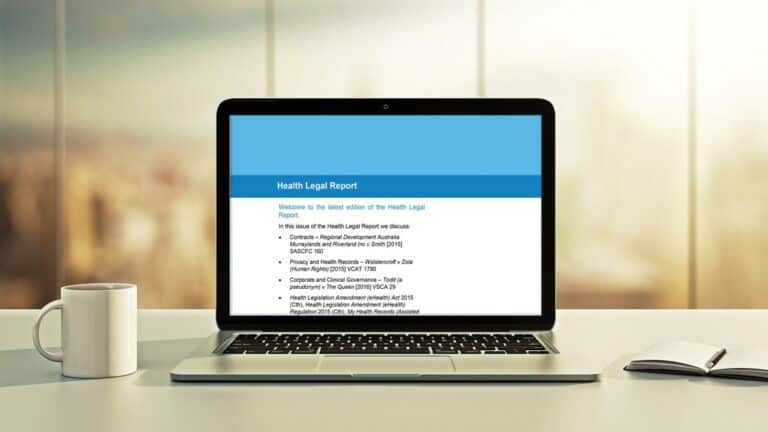This article applies to disability service providers, registered NDIS providers and specialist disability accommodation service providers.
Disability and Social Services Regulation Amendment Bill 2023 (Vic)
Please be advised that the Disability and Social Services Regulation Amendment Bill 2023 (Vic) (the Bill) passed Victorian Parliament on 16 May 2023 and received Royal Assent on 23 May 2023. Part 1, Division 1 of Part 2, Part 5 and Part 7 commenced on 24 May 2023, while the remainder of the Bill will commence on 1 July 2024, unless proclaimed earlier. The Bill amends various legislation including the Disability Act 2006 (Vic) (the Act) and the Residential Tenancies Act 1997 (Vic) (the RT Act).
The purpose of the Bill is to make various amendments to the Act including in relation to the sharing of information about persons with a disability, persons subject to restrictive practices and supervised treatment orders, residential services, and the compulsory treatment of persons with an intellectual disability. The Bill also amends the RT Act in relation to Specialist Disability Accommodation (SDA) enrolled dwellings.
Amendments to the Disability Act
Information sharing
The Bill inserts new Part 8A into the Act relating to the use and disclosure of information. Part 8A largely re-enacts sections 39 and 39A, which the Bill repeals, with some amendments. Under Part 8A, the disclosure of protected information will be prohibited, unless done so in accordance with the Act, or any other Act.
Protected information means information that is gained by or given to a relevant person in their official capacity and identifies, or is likely to lead to the identification of, a person to whom the information relates and is either obtained:
- during the course of providing disability services to the person; or
- by a relevant person using restrictive practices or implementing supervised treatment on the person.
Permitted disclosures under the Act will include:
- disclosure to a medical treatment decision maker within the meaning of the Medical Treatment Planning and Decisions Act 2016 (Vic), to the extent that it is necessary to enable the medical treatment decision maker to make medical treatment decisions on behalf of the person to whom the information relates;
- a supportive administrator and/or supportive guardian acting under a supportive administration or supportive guardianship order (respectively) within the meaning of the Guardianship and Administration Act 2019 (Vic); and
- an emergency service provider if the disclosure is reasonably required for the emergency service provider to carry out a function under any Act in relation to the person to whom the information relates.
Supervised Treatment Orders for persons with a disability
Under section 193 of the Act, the Victorian Civil and Administrative Tribunal (VCAT) may make a Supervised Treatment Order for persons with a disability and NDIS participants in certain circumstances. The Bill extends this section to clarify that the VCAT may only make a supervised treatment order if it is satisfied that:
- the person has previously exhibited a pattern of violent or dangerous behaviour causing serious harm to another person or exposing another person to a significant risk of serious harm; and
- there is a significant risk of serious harm to another person which cannot be substantially reduced by using less restrictive means; and
- the services to be provided to the person in accordance with the treatment plan will be of benefit to the person and substantially reduce the significant risk of serious harm to another person; and
- the person is unable or unwilling to consent to voluntarily complying with a treatment plan to substantially reduce the significant risk of serious harm to another person; and
- it is necessary to detain the person to ensure compliance with the treatment plan and prevent a significant risk of serious harm to another person.
Restrictive practices
The Bill inserts new Part 7 into the Act, replacing the existing provisions governing the use of restrictive practices. Importantly, new section 135 of the Act clarifies that a disability service provider or a registered NDIS provider must not use a regulated restrictive practice on a person in respect of whom new Part 7 applies unless an authorisation, issued by the Authorised Program Officer, for the use of the regulated restrictive practice is in force.
Authorised Program Officer is defined under the Act as a person appointed as an Authorised Program Officer by a disability service provider or a registered NDIS provider and whose appointment is approved by the Senior Practitioner.
Residential Services
Currently, under section 57 of the Act, a disability service provider providing residential services must provide a residential statement to residents. The Bill amends section 57 clarify that, in circumstances where there is more than one disability service provider who provides residential services at a residential service, only the disability service provider who provides the majority of the service is required to give the person with a disability a residential statement in accordance with section 57 of the Act. This will provide greater clarity regarding which provider is responsible for compliance.
Residential statements will also need to contain:
- the period of time a person is intended to reside at the service;
- any restrictions that apply in the residential service;
- supervision requirements and community access and support requirements;
- additional rights of residents, including:
- the rights and duties of the resident subject to any directions or orders made under any Act that requires the resident to live at the residential service including any conditions to which the resident is subject under any direction or order;
- the right to seek assistance from the disability service provider to contact an advocate to support the resident in relation to any concerns the resident may have regarding any order the resident is subject to or the conditions on the order they are subject to
Compulsory Treatment of Persons with Intellectual Disability
The Bill strengthens the protections for liberty and freedom of movement under Part 8 of the Act (Compulsory Treatment). Section 150A will be extended to provide that:
- a registered NDIS provider must not detain a person with an intellectual disability otherwise than in accordance with Part 8 of the Act; and
- a disability service provider or a registered NDIS provider must not use compulsory treatment on a person if the Senior Practitioner has not approved the appointment of the provider’s Authorised Program Officer.
Failure to comply with these obligations will result in a penalty of 240 penalty units (currently $44,381).
Amendments to the Residential Tenancies Act
Finally, the Bill makes changes to key definitions in relation to SDA under the RT Act. Firstly, the Bill substitutes the definition of SDA provider to clarify that it captures a person who is the owner or leaseholder of an SDA dwelling if the premises are let under, or are proposed to be let under, an SDA residency agreement or residential rental agreement to an SDA resident.
Secondly, the Bill inserts new section 498BA to explain that the meaning of SDA dwelling is:
- an SDA enrolled dwelling; or
- any other permanent dwelling that provides long term accommodation and where daily independent living support is provided to one or more residents with a disability funded by a specified entity or program and may comprise:
- an area or room exclusively occupied by an SDA resident and common areas shared by other SDA residents under an SDA residency agreement; or
- the dwelling as a whole occupied exclusively by an SDA resident under an SDA residency agreement; or
- the dwelling as a whole occupied under a residential rental agreement by at least one SDA resident and other occupants who may or may not be SDA residents.
Please click here to access the full Bill.




